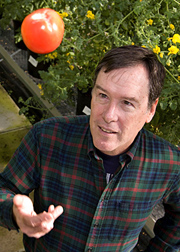|
|
|
|
Klee Delivers 2015 ARS B.Y. Morrison Memorial Lecture at ASHS Annual Conference
By Kim Kaplan
August 5, 2015
"A Different Approach to Plant Breeding: Integrating Consumers with Genetics" is the title of Harry J. Klee's 2015 Agricultural Research Service (ARS) B.Y. Morrison Memorial Lecture, which he delivered today at the American Society for Horticultural Science (ASHS) annual conference.
Klee, who is the Lyle C. Dickman chair for plant improvement in the Department of Horticultural Sciences at the University of Florida, could be called the trustee of true tomato taste. One of his major accomplishments is establishing a "consumer-assisted" breeding program dedicated to improving tomato flavor.
This program starts with finding out what consumers want in a tomato and then systematically works back from those desires to determine the chemical composition and then the biochemistry that provides it. Ultimately, the aim is to find the genes that control how the plant makes what consumers want.
The B.Y. Morrison Memorial Lecture series was established in 1968 by ARS to honor the memory of Benjamin Y. Morrison (1891-1966), to recognize scientists who have made outstanding contributions to horticulture and other environmental sciences, to encourage the use of these sciences, and to stress the urgency of preserving and enhancing natural beauty. Morrison was a pioneer in horticulture and the first director of the U.S. National Arboretum in Washington, DC.
Klee's large-scale genomics approaches for improving tomato flavor initially focused on varieties for the home garden market and then expanded into commercial germplasm. He now has access to more than 300 complete tomato genome sequences responsible for aspects of flavor, a number of them are the result of a major collaboration with researchers in China.
Klee summed up his presentation by pointing out that "flavor is the most important of consumer traits. Yet it is also the least understood and most difficult challenges for breeding. We seek to understand the underlying chemistry of flavor preferences and turn that knowledge into a molecular toolkit for breeders. Ultimately, the goal is to understand precisely what the consumer wants and deliver that product in a way that drives consumers to adopt healthier diets."ARS is the U.S. Department of Agriculture's (USDA) principal intramural scientific research agency.

